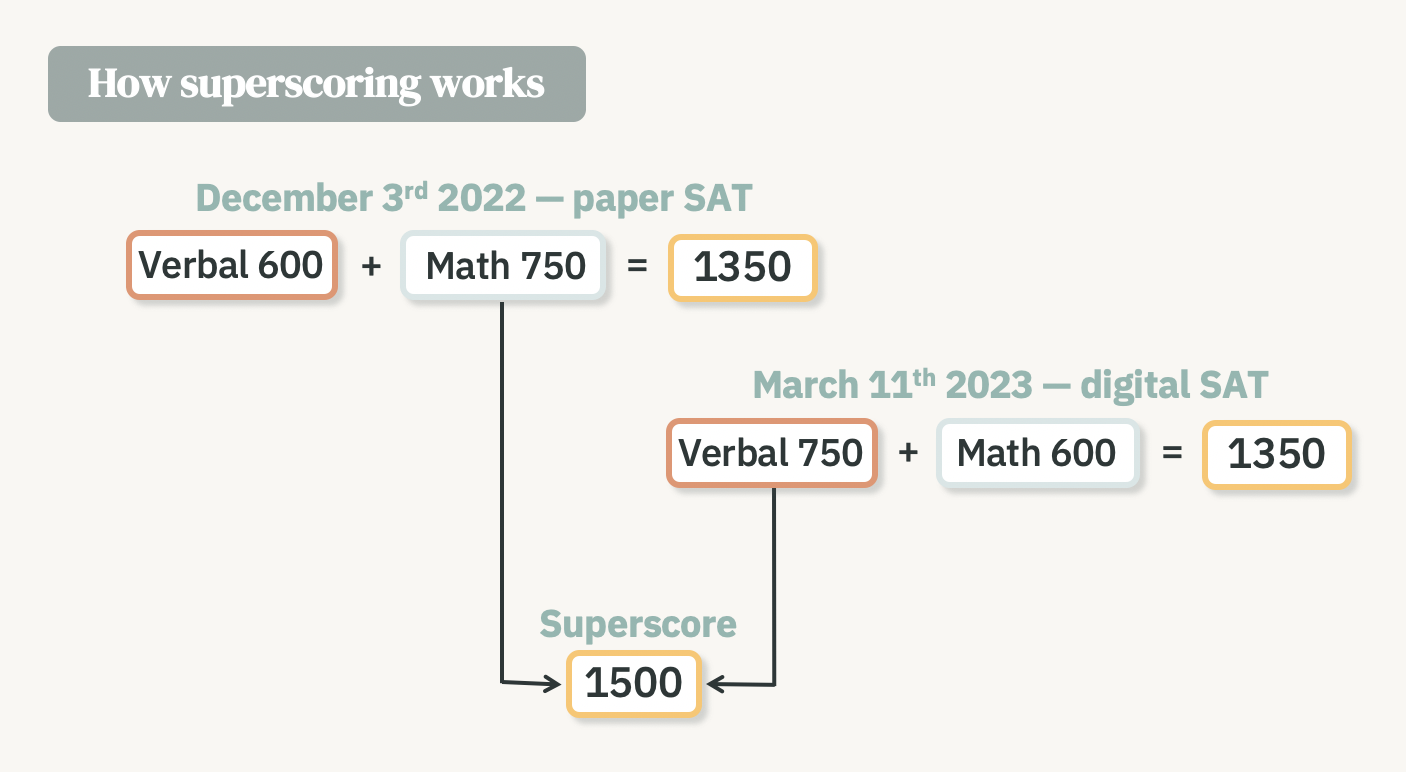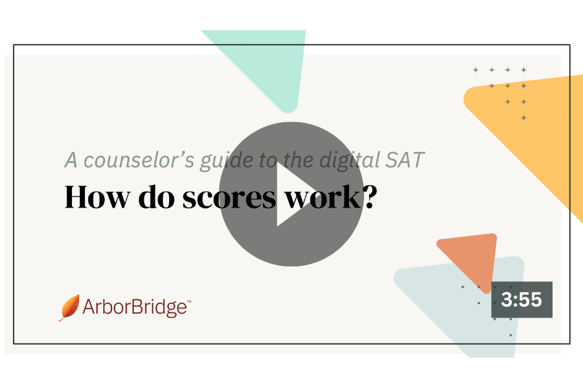The biggest news in the testing world is that the SAT has gone digital. While some things are staying the same, much has changed.
In this series, we’re answering counselors’ biggest questions about the new SAT. We’ve already covered the ins and outs of adaptive testing, as well as testing timelines and what your students should consider when deciding when to test. This time, we’ll answer your questions about how digital SAT scores work. Click below for a video version of this post.
Are digital scores comparable to paper scores?
Yes.
At least, that’s what the College Board says. The SAT is still scored on a scale of 400 to 1600 points. And even though the question types and structure of the digital SAT are meaningfully different from the old paper-based exam, the digital exam is designed to test the same underlying skills and knowledge.
To ensure the new exam is comparable to the old in how it measures student performance, the College Board conducted years of extensive analysis and internal testing. Then, in 2022, leading up to the digital SAT’s first full administrations, thousands of students participated in pilot testing. They took both the new digital exam and the old paper exam a few weeks apart and their performance on each was compared. In this way, the College Board ensured that different exam formats produce similar results.
Are SAT/ACT concordance tables going to change?
No—at least, no plans have been announced to change them.
We also don’t anticipate them changing. For both the SAT and ACT, how scores align with percentiles has not changed. Because new SAT scores are comparable to old SAT scores, and the ACT has no immediate plans to change, there wouldn't be a reason for the concordance tables to change. So, for instance, a 30 on the ACT is still going to be roughly comparable to a 1400 on the digital SAT.
Can students still superscore?
Yes, though different colleges will still have different policies.
According to the College Board, students will still be able to superscore—meaning that when students send their scores to colleges and universities, they can submit a superscore that combines their highest Verbal and Math scores from different test dates. Students will also be able to superscore across different digital exams and even between digital and paper exams.

So, for instance, let’s say an international student takes the paper SAT in December 2022 and scores 600 on the Verbal sections and 750 on the Math sections. They then take the digital test on its first international date, in March 2023, and their section scores are flipped—750 Verbal, 600 Math. Rather than be stuck submitting either of those 1350s, that student could then submit a superscored 750 Verbal, 750 Math—1500 points overall.
However, it's important to note that different universities will have different policies. While many universities allow applicants to submit superscores for the paper SAT, there are some notable exceptions. We imagine this will still be the case after the switch to digital.
Will colleges accept digital SAT scores?
Yes, and digital scores will probably be given the same weight as paper SAT scores.
In order for the transition from paper to digital to be successful, universities have to buy into the validity of this test. And the College Board has been careful with this: in the year leading up to the change in test format, they were already doing work to maintain support from universities.
By announcing their plans in the spring of 2022, the College Board provided universities 1 year of advance notice for international applicants and 2 years of advance notice for the bulk of their student body (domestic applicants). Since the announcement, the College Board has also spent time doing outreach and sharing the results of ongoing research with the goal of keeping the confidence of admissions counselors.
The College Board says that leaders in higher education have indicated they’ll continue to use digital SAT scores in the college admissions process, and everything we've seen so far supports this: Although colleges haven't yet made formal announcements about whether they will or won't accept digital SAT scores, at this point, their silence implies that they accept the change in format. After all, students who took the earliest digital SAT pilots in the spring of 2022 applied to colleges in the fall of that year, and there were no reports of colleges differentiating between digital or paper scores.
Everything about the College Board's approach is in stark contrast to how ACT handled their own switch to computer-based testing a few years ago. At the time, ACT’s announcement seemed sudden, and like it took colleges and counselors by surprise. Unlike ACT, the College Board is a member-run institution (and many of those members have deep ties in the higher-ed community), so they seem to have done a better job behind the scenes.
Need more individualized advice?
If you have specific questions, reach out to our experts here. We’re happy to help in any way we can.
About ArborBridge
ArborBridge is the global leader in innovative, digital, one-on-one tutoring. With nearly a decade of experience teaching students online, ArborBridge supports students of all kinds: home schoolers, AP students, test preppers, and more. Our tutors specialize in creating personalized plans and in providing compassionate support for students and families.







